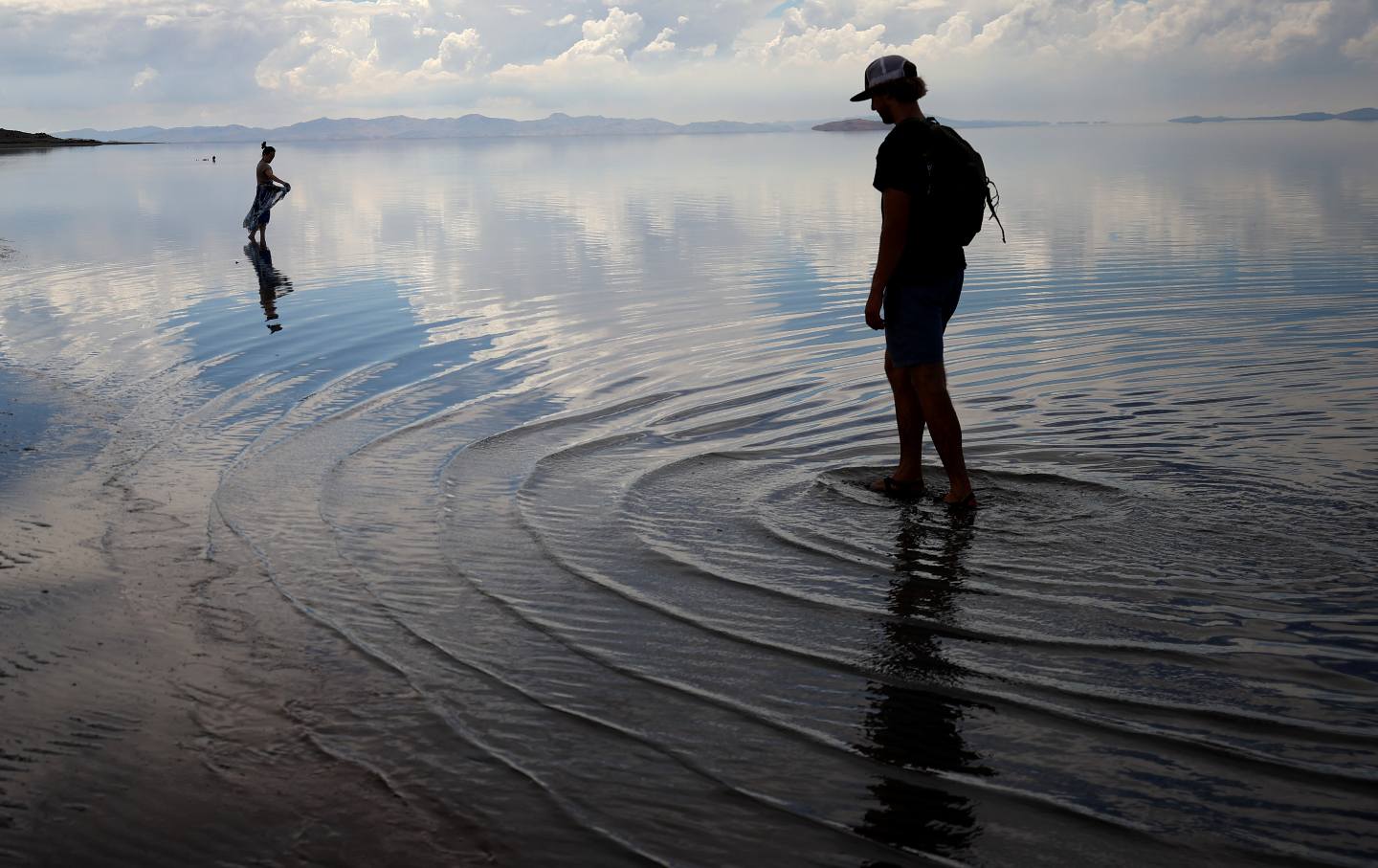Once called the “Territorial Insane Asylum,” today’s Utah State Hospital was built 140 years ago in what was then the faraway Provo foothills on purpose. The distance was the point.
Now, the hospital is anything but tucked away. The land it sits on is worth millions, right next to a water park eager to grow. There are a handful of local elected officials antsy to explore the potential for big change that its sale could provide.
Standing in their way, however, is the more than 300-acre hospital campus itself that lawmakers have invested millions into over the years to modernize.
Dallas Earnshaw, the hospital’s nearly 20-year superintendent, took The Salt Lake Tribune on a tour of the site on a sunny day in April to underscore the importance of the facility staying put.
Standing outside one of its buildings, he said past concerns over staffing shortages and long patient waitlists have been resolved, with most patients waiting about a month for treatment, a marked improvement. As he spoke, colorful slides from the water park next door peaked over trees that provide shade on the lush green campus.
(Francisco Kjolseth | The Salt Lake Tribune) The Splash Summit Waterpark is pictured in the distance as Dallas Earnshaw, superintendent of the Utah State Hospital in Provo, gives a tour on Tuesday, April 22, 2025. The owners of the water park have expressed interest in the hospital site.
“You’ve heard rumblings that there are private investors who want to move us [and] buy the land. That’s the people that own the water park,” Earnshaw said. “They want to buy this land and develop it.”
State lawmakers have also explored its sale. And Utah County Commissioner Amelia Powers Gardner in February sponsored a resolution that indicated the commission supports looking into its sale, too.
“There’s no way on God’s green earth,” Earnshaw continued, “we would ever replicate this beautiful campus if we moved.”
What the hospital does
The state hospital has 378 beds available for intensive in-patient treatment, split between civilly committed adults and children and the forensic unit, which houses adults charged with a crime who are not considered mentally competent enough to continue court proceedings, as well as those found “not guilty by reason of insanity” or “guilty and mentally ill.”
(Francisco Kjolseth | The Salt Lake Tribune) A residential bedroom in one of six forensics units at the Utah State Hospital in Provo is pictured on Tuesday, April 22, 2025.
In 1955, the hospital housed as many as 1,500 people, back when the facility was “little more than a human warehouse,” the hospital says of its history on its website.
But in 1969, Utah began to transition away from a more state-centric system to a county-focused one. That led to the creation of 14 mental health centers — like Wasatch Behavioral Health and Salt Lake Behavioral Health — across the state, where people with less intensive mental health needs can receive care closer to home.
“Every once in a while, you’ll have somebody whose mental illness is so severe they don’t stabilize, they’re still pretty sick, and they need more intensive care,” Earnshaw said. “That’s who we get.”
(Francisco Kjolseth | The Salt Lake Tribune) The central control room helps staff manage locked doors and observe patients in the forensics facility at the Utah State Hospital in Provo on Tuesday, April 22, 2025.
Getting people to the sprawling site hasn’t been without challenges. In 2015, the Disability Law Center sued because inmates who required treatment there were staying in jail for too long without a conviction, waiting for beds to open up. By the time the complaint was filed, that waitlist had grown to about 100 people.
The hospital also suffered until a critical staffing shortage — down about 180 people — during the COVID-19 pandemic, Earnshaw said.
Now, he added, “we actually have a wait list for nursing positions.”
Why some argue it should be sold
Even with those improvements, Powers Gardner said the state’s mental health system doesn’t adequately address its resident’s needs, especially as Utah has grown. That’s why she sponsored the commission’s resolution, she said, which beyond a sale also supported alternative solutions.
“We currently have just one state hospital — and it’s full. There’s a waiting list, and our ability to expand staff is limited by geography and infrastructure. It’s a system bottleneck,” she said in a written statement, “and it’s hurting people across the state.”
(Francisco Kjolseth | The Salt Lake Tribune) A private courtyard offers a natural environment for patients at the Utah State Hospital in Provo on Tuesday, April 22, 2025. Gardening programs allow patients to plant flowers, grow vegetables and work with a horticulturalist.
She mentioned a friend whose son has schizophrenia and has been hospitalized for treatment more than 70 times. They live in Washington County, Powers Gardner said, and have been waiting on an evaluation to see if he can get a bed at the state hospital.
“If he gets a bed in Provo, she’s asked me to visit him because it’s simply too far and too hard to access. This isn’t a Provo issue. This is a statewide crisis,” she said. “We need a mental health system that serves everyone in Utah — not just those lucky enough to live nearby.”
Earnshaw said the facility has adequate civil beds but lacks about 60 forensic beds. Currently, he said, “overflow” forensic patients are being housed in another building on campus previously meant for civil patients.
(Francisco Kjolseth | The Salt Lake Tribune) Utah State Hospital superintendent Dallas Earnshaw gives a tour of the Mountain Springs Pediatric Center at the hospital in Provo on Tuesday, April 22, 2025.
Yet, the same concerns that prompted Powers Gardner’s resolution also inspired Rep. Tyler Clancy, as well as Rep. Jon Hawkins, to each run bills in two consecutive years looking to sell the site.
The latest, Clancy’s HB299, mandated a study of forensic beds and court-ordered civil commitment. Its findings will be presented to lawmakers during the interim legislative session next month.
“I think,” Clancy said, “that that’ll probably lead us into some directions of, ‘What does that look like? What does the future look like?’”
Another factor? The Splash Summit water park next door is hungry for expansion.
The water park next door
(Francisco Kjolseth | The Salt Lake Tribune) Splash Summit Waterpark in Provo is pictured on Tuesday, April 22, 2025. Its owners have expressed interest in the Utah State Hospital campus next door, which is located on “prime real estate,” as expressed by a Utah lawmaker.
Splash Summit’s interest in the state hospital site isn’t a secret.
In January 2023, Hawkins, R-Pleasant Grove, told the House Economic Development and Workforce Services Committee when he was running his bill, HB177, that “the owner of Splash Summit, who owns the property right next to the state hospital,” approached him with the idea.
Hawkins conceded that the property was “prime real estate” and that “there is an economic development opportunity here.“
“But,” he continued, “that is not why I’m running this bill.”
Instead, he said, he wanted to address longstanding issues with the state’s mental health system and bring in a commission to find a new site — just like officials did before today’s Utah State Correctional Facility’s moved from Draper to Salt Lake City’s west side in 2022 to make way for The Point development.
The water park donated $4,000 to Hawkins months after he proposed his bill, according to campaign finance disclosures. Hawkins did not return The Tribune’s request for comment.
(Trent Nelson | The Salt Lake Tribune) Commissioner Amelia Powers Gardner during a Utah County Commission meeting in Provo on Wednesday, July 16, 2025.
Powers Gardner said she’s also been approached by the Splash Summit owners about the hospital. She has a “professional relationship” with them, she said, but added their introduction happened “long after my concerns about the mental health system were already forming.”
Representatives of Splash Summit did not respond to The Salt Lake Tribune’s multiple requests for comment.
The park’s owners still seem to be eyeing an expansion, though. They separately sought a public-private partnership with Provo this spring to build a larger water park and develop the nearby Slate Canyon Park.
But after poor public response to a developer’s pitch for that plan at a neighborhood meeting in late April, Provo Mayor Michelle Kaufusi announced in July that the “owner’s proposal to buy this land is fully and completely declined.”
140 years later, what’s next?
(Francisco Kjolseth | The Salt Lake Tribune) Dallas Earnshaw, superintendent of the Utah State Hospital in Provo, points out a painting at the hospital by Kenny Davis in honor of Beethoven’s “Moonlight Sonata,” on Tuesday, April 22, 2025.
When Provo first cropped up on the east side of Utah Lake — then a full day’s journey from Salt Lake City — most of its population lived on farmlands on what is now the west side of Interstate 15, Earnshaw said.
There wasn’t much industry, so the city’s earlier leaders went to Utah’s Territorial Legislature and asked for help, looking to create more local jobs. They thought the Utah State Hospital could become an economic engine, Earnshaw said.
These legislators had initially eyed the original statehouse in Fillmore for the planned hospital after they’d settled on Salt Lake City for the Capitol, but ultimately settled on Provo. The hospital opened on July 15, 1885, nearly 11 years before Utah became a state.
“They had a lot of political clout, even back then,” Earnshaw said, “here in Utah County.”
(Francisco Kjolseth | The Salt Lake Tribune) Early forms of restraints used in a psychiatric hospital are displayed at the Utah State Hospital museum in Provo on Tuesday, April 22, 2025.
While the hospital once drove revenue, Powers Gardner said that’s no longer the case. It provides jobs and student training, she acknowledged, and patients’ families who travel to Provo likely spend money in town.
“However, I have not seen economic data that suggests the hospital is a major economic engine for the county or city. In contrast,” Powers Gardner said in a written statement, “any development on that land — whether it’s retail, resort, residential, or mixed-use — would likely generate significantly more tax revenue, create new jobs, and revitalize that area of Provo.”
She added that she would like to see any money from such a sale go toward building and funding a regional system of five or more mental health facilities across the state.
(Francisco Kjolseth | The Salt Lake Tribune) A timeout quiet room is pictured in the youth wing of the Utah State Hospital in Provo on Tuesday, April 22, 2025. Children under 12 being treated for serious mental issues are managed at the Mountain Springs Pediatric Center on campus.
A complete cost estimate and feasibility study hasn’t been done yet, so it’s unclear how much it would cost to recreate the resources currently available in Provo, according to a provided statement from the Utah Department of Health and Humans Services, which oversees the hospital.
“We know that the cost for the current buildings was somewhere around $650 million,” the statement read. “The reality of moving the hospital would require new buildings and land acquisition, which we really wouldn’t know unless a plan were created to move it.”
The city of Provo has remained relatively mum on the issue. Provo spokesperson Nicole Martin said the city didn’t initiate any of the recent proposals mulling a sale of the property.
(Francisco Kjolseth | The Salt Lake Tribune) A two-way mirror allows for behavioral observation in the Maple Play therapy room at the Utah State Hospital in Provo on Tuesday, April 22, 2025.
“The location and provision of state mental health services is not a simple issue. More importantly, it is a state issue,” she said. “Provo City has not felt compelled to weigh in one way or another on these proposals.”
DHHS also has not taken a position on moving the hospital.
“We are committed to maintaining an open dialogue with state and local officials about the future of the hospital,” the department said in a provided statement, “and we are hopeful that those conversations will be thoughtful and focused on the behavioral health needs of the population.”
The agency added that it was “optimistic that any future changes would include a thorough assessment of the behavioral health needs and plans for how to replicate or improve the services that are offered to Utahns who need critical care.”
Note to readers • This story is available to Salt Lake Tribune subscribers only. Thank you for supporting local journalism.

















